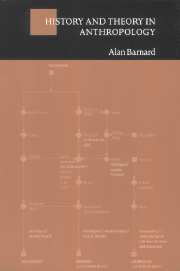Book contents
- Frontmatter
- Contents
- List of figures
- List of tables
- Preface
- 1 Visions of anthropology
- 2 Precursors of the anthropological tradition
- 3 Changing perspectives on evolution
- 4 Diffusionist and culture-area theories
- 5 Functionalism and structural-functionalism
- 6 Action-centred, processual, and Marxist perspectives
- 7 From relativism to cognitive science
- 8 Structuralism, from linguistics to anthropology
- 9 Poststructuralists, feminists, and (other) mavericks
- 10 Interpretive and postmodernist approaches
- 11 Conclusions
- Appendix 1 Dates of birth and death of individuals mentioned in the text
- Appendix 2 Glossary
- References
- Index
1 - Visions of anthropology
- Frontmatter
- Contents
- List of figures
- List of tables
- Preface
- 1 Visions of anthropology
- 2 Precursors of the anthropological tradition
- 3 Changing perspectives on evolution
- 4 Diffusionist and culture-area theories
- 5 Functionalism and structural-functionalism
- 6 Action-centred, processual, and Marxist perspectives
- 7 From relativism to cognitive science
- 8 Structuralism, from linguistics to anthropology
- 9 Poststructuralists, feminists, and (other) mavericks
- 10 Interpretive and postmodernist approaches
- 11 Conclusions
- Appendix 1 Dates of birth and death of individuals mentioned in the text
- Appendix 2 Glossary
- References
- Index
Summary
Anthropology is a subject in which theory is of great importance. It is also a subject in which theory is closely bound up with practice. In this chapter, we shall explore the general nature of anthropological enquiry. Of special concern are the way the discipline is defined in different national traditions, the relation between theory and ethnography, the distinction between synchronic and diachronic approaches, and how anthropologists and historians have seen the history of the discipline.
Although this book is not a history of anthropology as such, it is organized in part chronologically. In order to understand anthropological theory, it is important to know something of the history of the discipline, both its ‘history of ideas’ and its characters and events. Historical relations between facets of anthropological theory are complex and interesting. Whether anthropological theory is best understood as a sequence of events, a succession of time frames, a system of ideas, a set of parallel national traditions, or a process of ‘agenda hopping’ is the subject of the last section of this chapter. In a sense, this question guides my approach through the whole of the book. But first let us consider the nature of anthropology in general and the meaning of some of the terms which define it.
Anthropology and ethnology
The words ‘anthropology’ and ‘ethnology’ have had different meanings through the years. They have also had different meanings in different countries.
- Type
- Chapter
- Information
- History and Theory in Anthropology , pp. 1 - 14Publisher: Cambridge University PressPrint publication year: 2000
- 1
- Cited by



